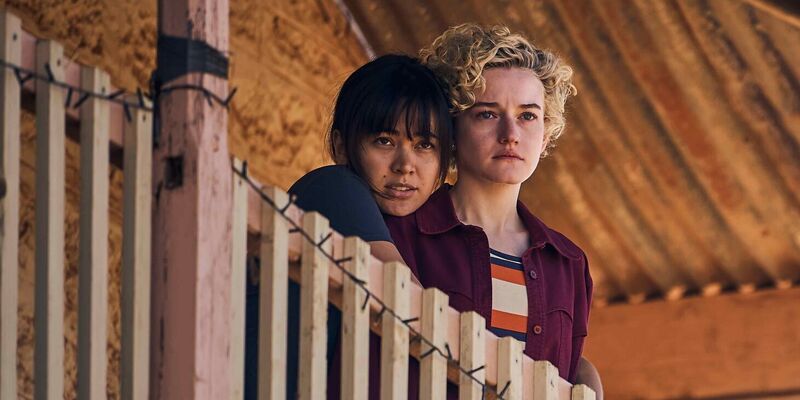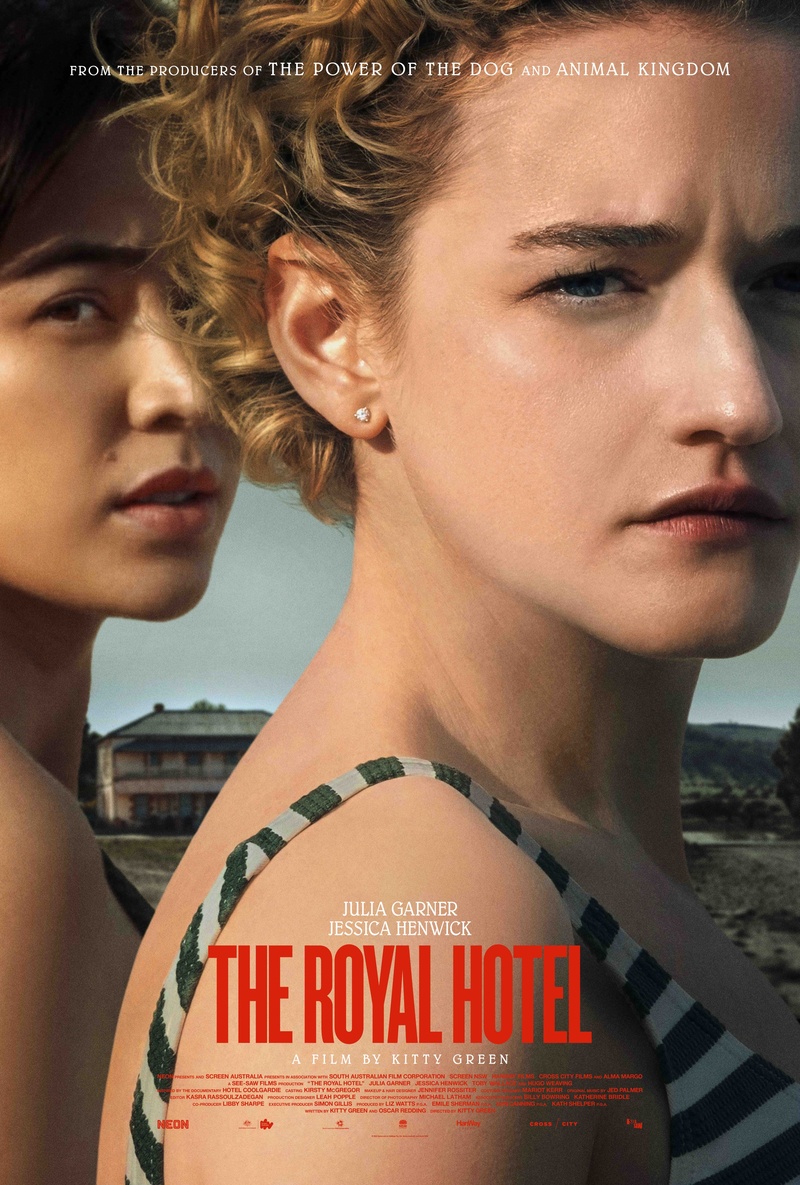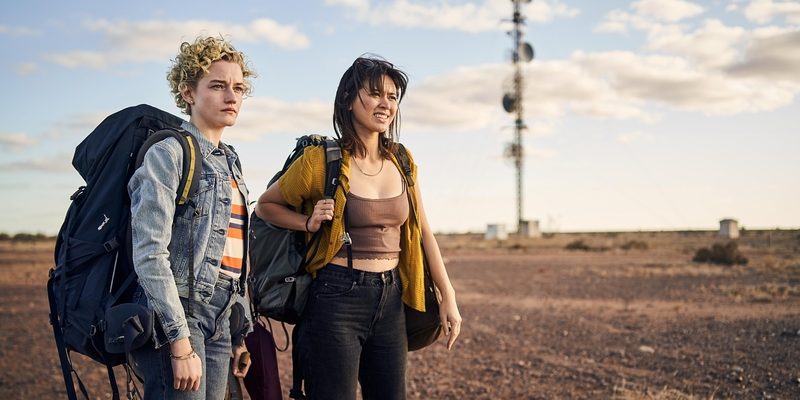
Two American backpackers run into trouble when they take a job at a
remote pub in the Australian outback.
Review by
Eric Hillis
Directed by: Kitty Green
Starring: Julia Garner, Jessica Henwick, Hugo Weaving, Toby
Wallace, Daniel Henshall, James Frecheville, Ursula Yovich

Australian filmmaker Kitty Green made a striking transition from
documentaries to narrative features with 2020's
The Assistant. That film was inspired by the real life exploits of Harvey Weinstein,
though his name was never mentioned and only his voice was heard, with
the film focussed instead on a young assistant played by
Julia Garner. For her second narrative film Green has returned to
Australia. The Royal Hotel is also inspired by real events
as seen in the 2016 documentary Hotel Coolgardie, which documented the sexism and xenophobia experienced by a pair of
young female Finnish backpackers working as bartenders in the outback.
Green's two narrative films may have wildly different settings but both
are centred on workplace harassment.
Along with real events, Green's film is clearly inspired by Australia's
unique tradition of movies about people running into trouble in the
unforgiving outback, whether at the hands of other humans or nature. She
opens her film with an ominously brooding dance remix of Men at Work's
'Down Under', an early sign that she's interrogating Australian pop
culture. The tune is playing in what we assume is a nightclub where
American backpackers Hanna (Garner) and Liv (Jessica Henwick) are
dancing and fending off unwanted male attention and encouraging
desirable male attention. When Liv exits via a stairs we realise the
party is being thrown in the middle of the day on a boat cruising
through Sydney's famous harbour. The girls' partying is halted when Liv
discovers her credit card is maxed out, leading them to look for
work.

The only jobs their work/travel agency can offer is tending bar at The
Royal Hotel, the sole pub in a remote mining town. When the agent
mentions the girls should be prepared to deal with male attention Liv
beams with anticipation while Hanna takes it as the intended
warning.
Said male attention begins on the girls' first night at the rowdy bar.
Their predecessors, a pair of vulgar English girls, are celebrating
leaving the establishment. Flashing their breasts and allowing
themselves to be manhandled by the miners, it's clear that willingly or
as a means of survival, these girls have embraced expectations. While
Hanna is horrified, Liv seems excited by the raucousness and lack of
inhibition. "That'll be us in a couple of weeks," she jokes. Hanna
doesn't find it amusing.
Beginning with annoying requests for "a smile" from the glum Hanna, a
campaign of torment is waged by Dolly (Daniel Henshall), a
particularly creepy patron prone to fits of violence when intoxicated.
Hanna's attempts to convince Liv that they should leave are batted away
as Liv accuses Hanna of being uptight and not giving the locals a
chance.

If you've seen any "Ozploitation" movies like Fair Game, Razorback or The Boys, you'll know Hanna is right to be wary of the sozzled bogans
constantly eyeing up the "fresh meat" behind the bar.
The Royal Hotel may well work best for those viewers familiar with the
tradition Green is working within here, as it adds an extra layer of
tension. Green knows exactly what she's doing by casting Henshall as the
main antagonist, reminding us of the serial killer he so chillingly
portrayed in Justin Kurzel's Snowtown. When Henshall's Dolly walks into the bar for the first time and sets
his gaze on the girls it's instantly unsettling. Toby Wallace's
casting as the initially charming but increasingly suspicious Matty
reminds us of the charismatic rogue he played in Shannon Murphy's
Babyteeth. James Frecheville is physically unrecognisable from the
teenage budding gangster he played in his breakout, David Michod's
Animal Kingdom, but he plays a character here who is a similar blend of innocence and
coiled up rage.
Garner is similarly deployed. Her Hanna could almost be the same
character she played in The Assistant. Both are taciturn young women who seem to feel uncomfortable in the
presence of others, regardless of whether they're threatening or not. In
The Assistant there was the subtle implication that her
character was aggrieved as much by the attention her employer was giving
to other women as by his abuse of said women. Here Hanna's final act
explosion of rage comes at a time when she's been rejected by her
potential male suitors while Liv is receiving all the attention. Hanna
and Liv don't seem to have much in common beyond being strangers in a
strange land, and they both react to their new surroundings in
completely different ways. While Hanna tries to keep her head
down, Liv appears to decide the best way to stay sane here is to
embrace the madness. Like the initially stuffy English protagonist of
Aussie classic Wake in Fright, Liv throws herself into the chaos of her new surroundings, driving a
wedge between herself and Hanna.
The Assistant was set in a stoic Manhattan office where
silence was expected, and Green directed the film with a distanced
coldness, often filming long takes of Garner performing menial tasks.
Here her filming style is more in keeping with the rowdiness of the
setting, with much quicker cuts and an increasingly rapid pace as the
tension escalates. One holdover from her previous film is how the
protagonists see and hear what they want until things reach a point
where they have to take a stand. The Assistant saw Garner
standing outside her employer's door trying to figure out if the muffled
sounds from within were laughs or cries. This is repeated here with the
sounds coming from the mobile home shared by the pub's alcoholic owner
(Hugo Weaving) and his long-suffering wife (Ursula Yovich).

Unlike her Ozploitation predecessors, Green hasn't simply crafted a
black and white narrative of an innocent woman terrorised by brutal men.
As with The Assistant, the protagonist played by Garner isn't the easiest to warm to. She's
self-centred throughout, with the suggestion that Liv is funding her
trip, and her "rescue" of Liv seems motivated by jealousy as much as
genuine worry. There's also a subtle critique of the intolerance of
white Americans towards other cultures, with the mixed-race Liv
defending the Aussies' casual use of the c-word while Hanna expects them
to conform to her own cultural standards.
With her two narrative features, Green has added much needed nuance to
the largely binary conversation around the MeToo movement. Her films
portray men as predatory, regardless of whether they possess the power
of a Harvey Weinstein or are lowly blue collar grunts. But she also
dares to explore female complicity and refreshingly, she doesn't care if
we like her female protagonists or not. After all, victims come in all
personality types. For predatory men, a woman's "likeability" is
irrelevant. It's all just meat.

The Royal Hotel is on UK/ROI
VOD now.

